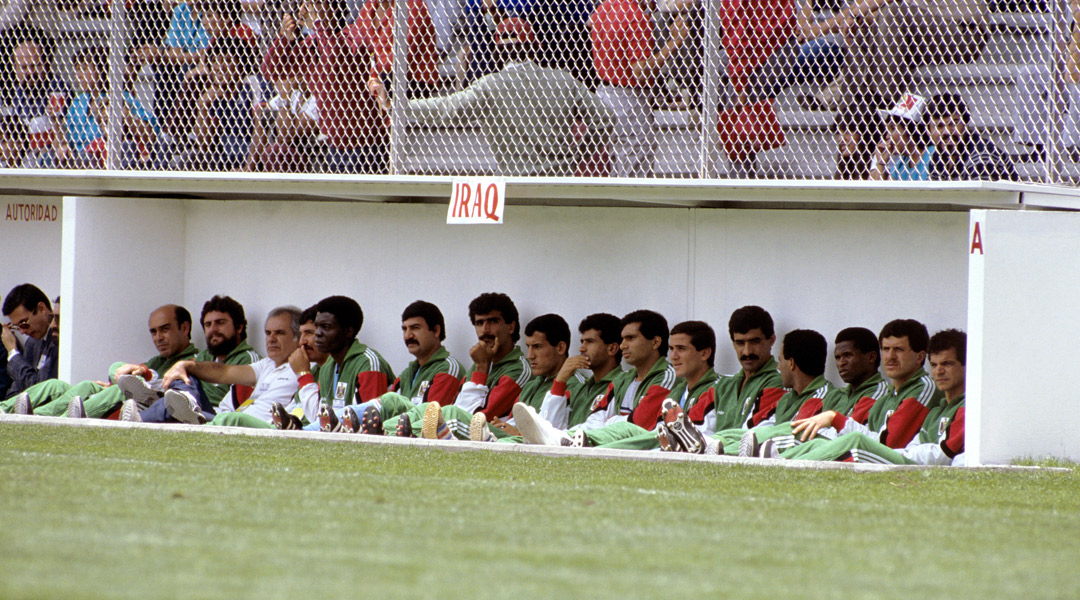Unlike the current state of Iraq’s national team, the 60’s signaled the start of an extraordinary era for Iraqi football. By far the greatest team in the Arab world, Iraq was among the best teams in all of the Continent. The national team contained an array of talented footballers who went on to achieve fantastic successes over the next few decades, winning the Arab Cup on four separate occasions (1964, 1966, 1985, 1988), the Gulf Cup three times (1979, 1984, 1988) and remain the only Iraqi side to ever qualify for the World Cup, in Mexico 1986.
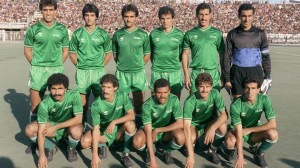
This era saw the rise of Ammo Baba as a tactical mastermind in Iraq, who managed the national team on six separate occasions. It also gave birth to Asian footballing superstars in the form of Hussain Saeed, Raad Hammoudi, Falah Hassan, Ahmed Radhi and Adnan Dirjal, to name but a few. However, what could have been a period of absolute dominance by Iraq when there was little competition, the national team failed to fulfil its undoubted potential. There are various factors contributing to this – some as controversial as claims that Gulf nations regularly bribed referees in order to beat Iraq, if conspiracy theories are to be believed. However, nothing came close to the destructive influence Saddam Hussein had on the national team in 1984, when he gifted Uday, his eldest son, the two honourable positions of head of the Iraqi Football Association and head of the Olympic Committee.
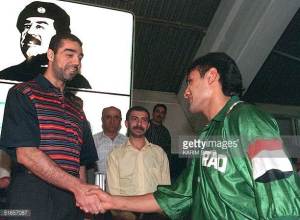
Uday Saddam Hussein’s appointment would go on to haunt Iraqi football for generations to come. This came only five years after Saddam Hussein’s dictatorial regime took force in the lands of the Euphrates. However, for all of Saddam’s psychotic and horrendous crimes, Uday was by far the more sadistic, violent and bloodthirsty. Feared by all he met, Uday soon begun an operation that would lead to the imprisonment, torture and abuse of countless athletes and staff members under his authority. Journalists too were at the end of Uday’s beatings, as Ali Riyah, now chief editor of Iraq’s sports daily Al-Qadissiya, found out for himself. Following a criticism in one of his match reviews, Uday was enraged and ordered Ali to be tortured with electrodes. “Uday’s cruelty knew no bounds,” said Ali. “No one was safe from him – entertainers, sportsmen, journalists. He hated us all. He enjoyed our suffering. He never inflicted it himself but liked to watch. He was really evil – far, far worse than his father.”
Over the years, Uday’s appetite for torture and death became increasingly overwhelming. During the periods in which he was in charge, Uday was actively involved in the torture and abuse of countless athletes, including footballers, wrestlers and boxers. There are hundreds of accounts that discuss the barbaric methods Uday used to strike fear into the athletes whom he had complete ownership over. During the Pan Arab Games final in 1999, Iraq had miraculously come back from a 4-0 deficit against Jordan, the hosts, with only 23 minutes left to play. The game finished 4-4 and a penalty shootout ensued. Iraq were required to nominate five penalty takers to step forward, however, the fear of Uday’s wrath lingered in the players’ minds. Knowing the risks involved in missing a penalty in such an important match for Iraq, only three players initially stepped forward to take the crucial penalty kicks. Abbas Rahim Zair, one of the three players who volunteered recalled the events: “Many of the footballers refused to even touch the ball, but then we realised that if no one accepted we would all be punished.”
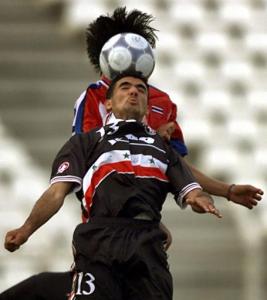
Unfortunately for Abbas, his missed penalty ended up sealing defeat for Iraq in an all-important final against rivals Jordan. Upon his return to Baghdad, the player was forced to attend a ‘meeting’ at the headquarters of the country’s Olympic committee. Inside awaited Uday and a leading figure in Iraqi sport. Abbas was quickly blindfolded and tortured, then sentenced to three weeks in a prison camp. Confinement was in fact a common punishment used by Uday on his players. Failure to attend a training session for any reason would often result in a short sentence. Once a player had been tortured, they would often be jailed in Al Radwaniya, Iraq’s most infamous prison. So often were the players whisked away to jail that some would bring pillows with them on the team bus. This allowed them to have something to sleep on in case they were taken away to a cell on match day should Uday deem it necessary. Tariq Abdul Ameer, the ex-Al Shorta player, described the fear facing Iraqi players, “Every player in the national believed and felt destined that a time in Al Radwaniya was in the offing. Any player or person who entered Al Radwaniya entered the door to hell.”
Uday’s ideal method of motivating his players would be to call the changing room before the match, or at half time. He would use this opportunity to threaten cutting off the players’ legs, or simply to remind the squad what consequences their families faced if they didn’t perform well. Failure to win a match was sanctioned by the entire team being whipped with electric cables whilst they performed press ups. Following this, players would be dragged through gravel pits, forced to climb up 20 meter high ladders and jump directly into raw sewage in order to ensure infection on their wounds. Other examples of Uday’s sheer insanity involve the Iraqi national side who had failed to qualify for the World Cup in 1994. As punishment, the squad was required to train using a concrete football for days.

Should a player experience a particularly poor performance, Uday would single him out and shave him bald – a sign of humiliation in Iraqi culture. Others may have also had their eyebrows shaved too, depending on the severity of the punishment. “Once you came to Uday’s notice, he never left you alone,” said former Iraqi captain Habib Jaffer. “He never let us quit or retire, and we were never able to play well because all these threats and bad treatment made us very tense.”
Yasser Abdul Latif was sentenced to solitary confinement after being accused of attacking a referee. After days of torture, he thought about leaving the game behind and never coming back. However, this was never a realistic option. “They threatened me,” said Yasser. “If I didn’t participate in the team, they said they would beat me again and again, and consider me an enemy of the regime, and that would mean death.”
“He was a thug. he called us and threatened us with things like physical abuse and sending us to the front lines of the [Iran-Iraq] war,” says Iraqi legend Basil Goreis. Uday’s intervention went beyond simply threatening players. Unfortunately, his involvement in team activities were also damaging. In preparation for World Cup 1986, Uday rejected the opportunity to organise friendlies with both England and Brazil for fear of an Iraq loss reflecting poorly on the Ba’athi regime. Uday opted for the team to play against Brazilian club sides instead. “Uday didn’t want to lose,” said Gorgis. “Even Brazil wanted to play us. Uday used to tell us: ‘What’s the difference between you and the Brazilian player? You wear Adidas shoes and he wears Adidas shoes.’ It was a joke. We ended up playing Flamengo and losing 3-1.”

The team arrived to Mexico in 1986 poorly prepared and terrified for their own safety. Failure to qualify from a tough group, including Mexico (hosts), Belgium and Paraguay could mean drastic consequences for the players and their families. The Iraqi side lost all three games by a single goal each, and only scored once in the process. Uday ordered all the players to be tortured upon their return to the country. Even the team’s stars were not exempted from punishment. Ahmed Radhi recalls the team’s fate, “if the team lost, he put the entire team in jail, or he cut our hair, or sometime he slapped the players around in the changing room.”
Laith Hussein was on the end of multiple beatings too. Iraq’s all time leading goal scorer was imprisoned in 1986, ’88, ’89, ’93, ’98 and 2000. He explained Uday’s psychotic logic, “because we lost at every championship and tournament, we developed a loser’s identity, as the Iraqi team always used to win at internationals. Uday became frustrated and didn’t know how to behave. He thought if he jailed or beat a player it would make them stronger and more vicious and would try to do anything in order to win the game.”
The actions of Uday were common knowledge but his gang of criminals were quick to cover up any traces of their actions. This included thorough preparations in the wake of FIFA investigations. Players carrying fresh scars were hidden from the public eye in order to dupe the FIFA officials.
The conditions Uday had created for Iraqi athletes were unworkable and many tried to flee. Some decided to leave the country and escape to the U.S. Former Iraqi international Mahmoud Hussain said that “they were escaping from Uday and his clan, who were treating them in a way devoid of morality and any common decency. They were so, so cruel to such a distant point that even I don’t like to go to. I retired early because of such treatment, at the top of my game, where I was even shot by Baathist forces on my left foot.”
Others simply retired prematurely. Mazin Yaseen, cousin of Iraqi international Yaser Kasim, explained how his father forced him to retire early in order to protect his son from Uday. Mazin told IraqFootball.me that he would go home after every training session traumatised and fearing for the safety of his family. Uday had randomly attended one of his u18 team training sessions and threatened all the players with their lives. “I had recently picked up an ankle injury that had kept me sidelined. My father used this as an opportunity to ask the team doctor to forge the medical reports and claim that the damage to my ankle was too substantial. We used this as an excuse for me to retire – otherwise Uday would have never let me walk away from the game.” It’s unknown what talents were extinguished without ever coming close to fulfilling their potential in Iraq.
Some did try to stand up to Uday’s psychotic ways. 1992 saw fans protesting against Uday when they shouted slogans against his oppressive regime but his security forces were called. This led to the death of three fans and 25 others badly wounded at the hands of Uday’s guards. It is unknown how many more were arrested and later tortured as a result of these protests in Basra.

However, it was Iraqi legend Ammo Baba who stood up to Uday like no other. His defiance in the face of Uday would have resulted in his imminent execution had it not been for Saddam’s protection. A national treasure like Ammo Baba would’ve caused pandemonium in the streets had Uday had his way with him. Such was the hatred that Uday reserved for him, he once beat Ammo Baba in front of 50,000 fans at the Al Shaab International Stadium.
“[Uday] used to call players before games and threaten them. Sometimes he telephoned the dressing room at half-time,” Baba recalled. “He talked nonsense. I told him to go to hell. I said he knew nothing about football. How did I survive? Because the people loved me.”
It was the love and adoration that the fans had for Ammo Baba that kept him alive in spite of his protests against Uday. Baba embodied the hearts and souls of all Iraqis in a time where they had no voice. His stance against oppression made him the most adored man in the country. However, this came at a price. Saadoon Sadam, a former Iraqi player recalls how Ammo Baba was called up to the Olympic Committee whenever the national side lost. “They detained him there in spite of the fact that Ammo suffered from diabetes,” he said. Ammo Baba, who was suffering from a heart condition and diabetes, nearly died as a result of the punishment his 65 year old body had endured.
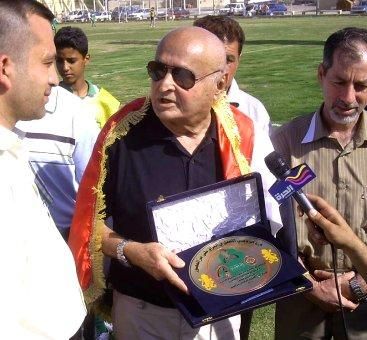
In spite of all the torture and misery that Saddam and his clan brought to Iraq, the country remains firmly on its feet and the national team is once again climbing up the pedestal. Iraq has only recently hosted its first international friendly in Basra and will look to build on its success despite ongoing security risks in the region. The will of the Iraqi people cannot be touched – even Saddam, in all those years, with all his power and military muscle, even he couldn’t crush the Iraqi national team and its fans. Iraqis love football too much and nothing will ever take that away from them.
“Thank God, today I feel we have the freedom to express ourselves with soccer. We couldn’t before but we can today. I feel we are free, I feel we have freedom and we’ll give more than we’ve given in the past.” – Laith Hussain


